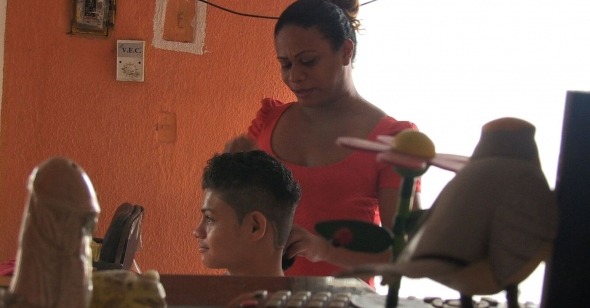Community Built
Rooney Elmi on New Films from Ambulante Más Allá
Going Beyond: New Films from Ambulante Más Allá played Sunday, January 13 as part of Museum of the Moving Image’s First Look 2019.
Mexico has an often overlooked, incredibly rich, yet grossly ignored documentary tradition, one that has been long aligned with political struggle and which spearheaded a democratized state of the art. From the Instituto Nacional Indigenista to the Chiapas Media Project/Promedios, there is a blueprint for connecting and training indigenous communities to video technology. Yet despite all this, there has long been a blind spot in contextualizing its revolutionary history within the global film canon.
Luckily, this nonfiction cinematic tradition is alive and well today with Ambulante Más Allá. AMA is a roving documentary festival launched in 2005 that provides the framework for building a inclusive independent filmmaking infrastructure, reclaiming an often maligned community and helping them curate their own identities on and off screen. Through workshops, the festival makes documentaries accessible, training disenfranchised filmmakers from Mexico and Central America and reaching audiences often left out of the conversation. The four documentary shorts showing as part of First Look 2019’s Going Beyond: New Films from Ambulante Más Allá document the contemporary Mexican experience, echoing the defiant nature of its cinematic past.
In Weck: Words Are My Voice, we’re introduced to the title character as he creates a promotional video for a conscious hip hop conference he’s organizing with friends. A tattoo artist who moonlights as a woke rapper, he struggles to fulfill his dreams within the traditional small town he calls home. Despite the obstacles ahead of him, Weck’s determination to establish Rap Awareness sees its way through with a finalized date and venue, marking the first event of its nature in Pinotepa Nacional, Oaxaca. Offering a dose of hip hop culture in an area that’s hardly known for its urban music, the free conference attracts a handful of fans but also confused elders and giggling teenagers who happen to walk by. Weck’s unwavering passion, come rain or shine, is clear throughout the film’s 24 minute run time. Weck credits his desire for artistic expression with saving him from the streets, and director Aldo Arellanes Antonio paints a portrait of a furiously artistic soul through a new kind of lens.
Vanessa Ishel Castillo Ortega’s The Sound of Waves follows a similarly rebellious youth, but this time our protagonist is a precarious and determined disabled Afro-Mexican 15-year-old, Elida. With surfing, painting, and the violin taking up most of her day, defiance of her mother devours the remaining few hours. Nicknamed “Candy Surfer,” Eilda is in the process of discovering her true passion, and it’s clear that nothing is going to stop her. The teen’s steadfast ambition is fueled by anger about the outdated social views on disability she faces every day—her productivity is constantly questioned because of her missing right arm. As the filmmakers set her on a journey towards self-realization, Eilda is given validation by the camera, as she bathes on the sun-kissed beaches on the Mexican Pacific coast.
Following the short program’s unified observational lens, David Montes Bernal’s Caress (Caricia) opens with the title character explaining a nearly fatal encounter with a former lover, establishing the threat of violence that hangs over her and all trans women. Navigating the streets of the Costa Chica region in Guerrero, one of the poorest areas in the country, Caricia dreams of being a dancer, her ambitions overshadowed by the reality of becoming a hairstylist, re-creating a space that’s often the site of hyper masculinity by opening her own salon for locals and queer friends. Also a symbol of a reimagined male dominated environments, the sixth annual Gay Olympics that’s being hosted in a neighboring town catches Caricia’s eye, but her desire to participate is muted by her business-oriented spirit, and also by the fact that she’s the primary caregiver to her aging mother. Caricia’s occasional voiceovers, narrating threatening encounters with men, offer an unfortunate dose of reality in an otherwise joyful expression of survival and community. The most vivacious of the four short films, Caress is dedicated to folks like Caricia, “fighting for freedom of gender expression.”
Taking a more surrealist approach than the other shorts, Magda or the Fish Folk, follows a 23-year-old midwife trainee who inherits a special gift from her matriarchal bloodline after receiving a message in a dream. With her newfound powers, Magda begins to lead workshops, helping women critically think about the patriarchal rule of their fishing town. This 30-minute film, which simulates a dreamlike state with ingenious editing, also makes for a great companion piece with Caress, due to its deployment of voice-overs as a technique to narrate violent stories without the burden of visual representation. Perhaps it could be translated as a strong indicator of the intra-community-based workshops held by Ambulante Más Allá, where deliberately avoiding moments of perturbation is a commonality, making these films rare in the trauma-porn visual ecosystem.
In her article “Mobilizing Indigenous Video: the Mexican Case,” Dr. Laurel C. Smith remarked, “Indigenous video is characterized by a particular methodology, one that is tempered by the desire to initiate and sustain respectful and reciprocal relationships with the indigenous peoples, places, and practices captured by a video camcorder lens.” The historic use of video as a tool of protest for indigenous voices to contest colonialist geopolitics as well as implement ownership over the gaze is amplified in AMA’s series of shorts. Together, The Sound of Waves, Caress, Weck, and Magda, or the Fish Folk magnify the diversity of identities throughout Mexican culture, perspectives that are often completely underrepresented in the greater national canon, and each exemplifies Ambulante Más Allá’s defiant “for us, by us” ethos.
Pictured above: Caress (Caricia)
